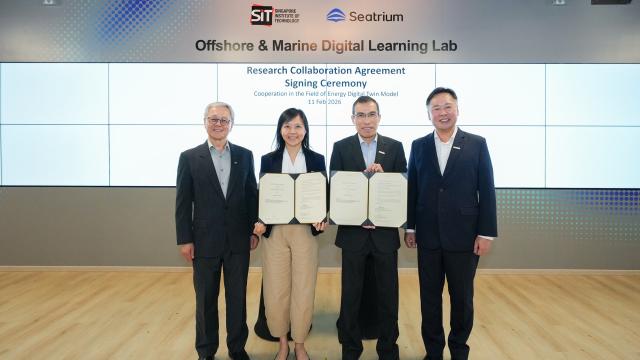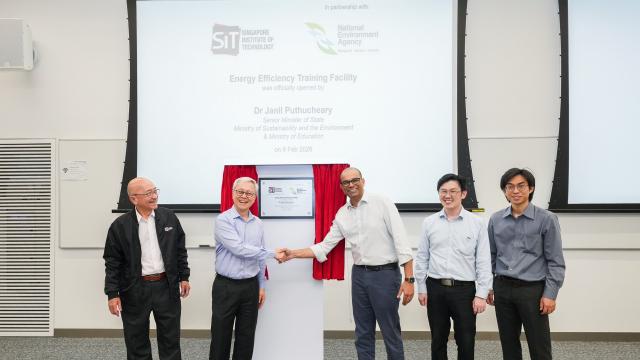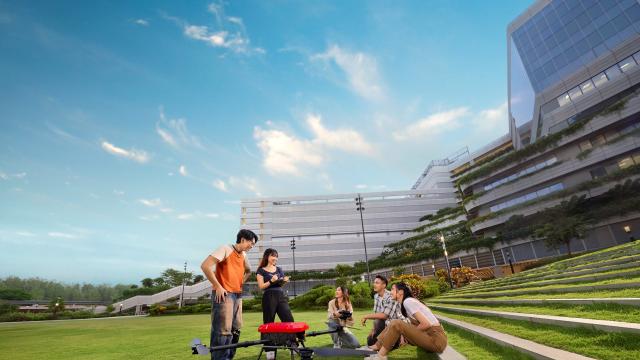- The Conservatory will serve as an integrated platform combining education, applied research, and community outreach focused on mangrove biodiversity and climate resilience.
- Strategically located within the SIT Punggol Campus and along the Punggol Heritage Trail, the conservatory will be easily accessible to the public.
- Supported by a S$680,000 donation from the Foundation of Rotary Clubs Singapore (FRCS).
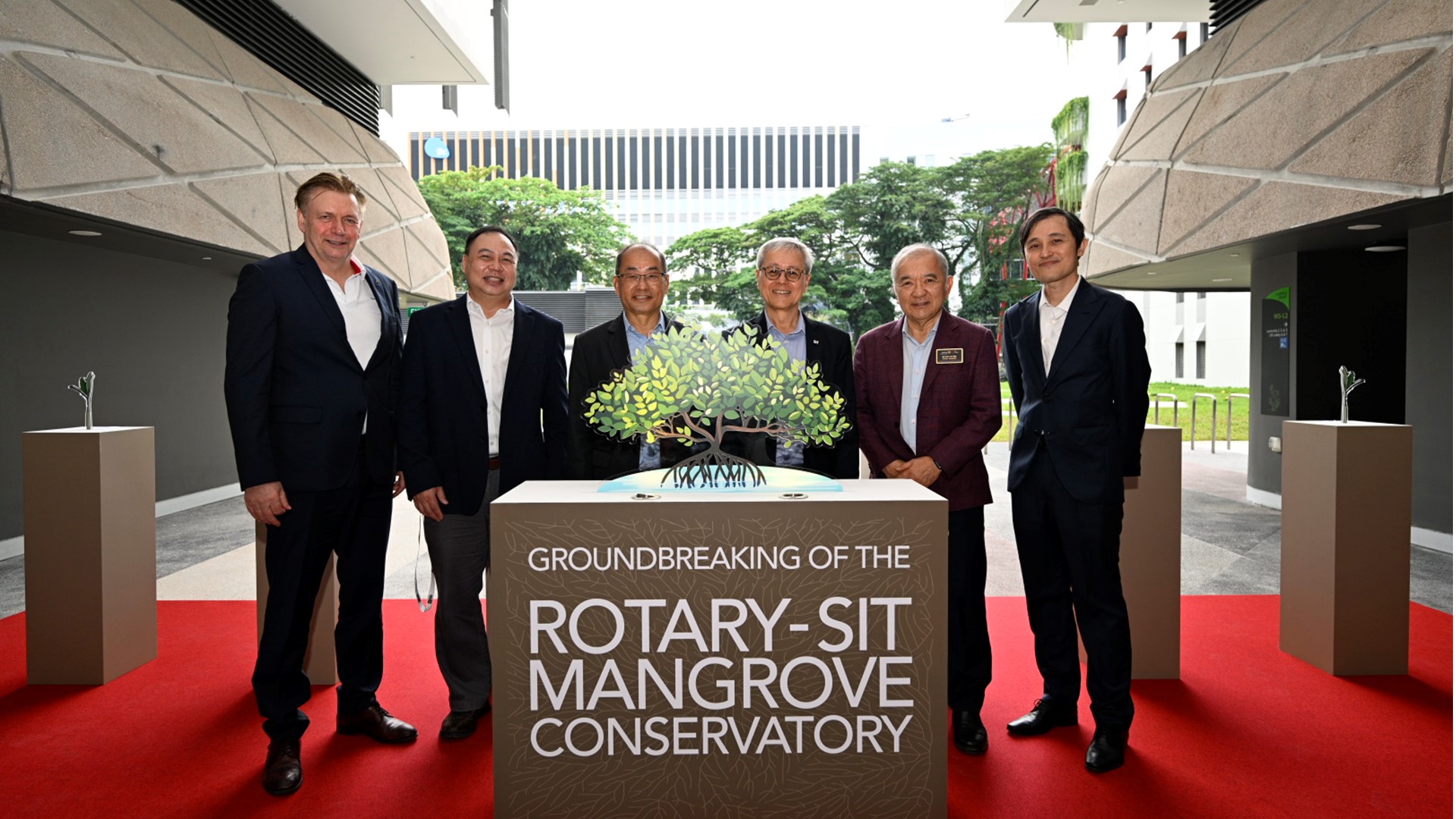
(From left) Mr Tom Wolf, President of the Rotary Club of Singapore; A/Prof Jeffrey Kwik, Engineering Cluster at SIT; Mr Chew Ghim Bok, Director on the Board of Directors, Rotary International; Prof Chua Kee Chaing, SIT President; Dr Yap Lip Kee, District Governor, Rotary International District 3310; Mr Marc Chan, Director of Advancement Office, SIT, at the Rotary-SIT Mangrove Conservatory Groundbreaking Ceremony on 16 June. (Photo: Tsang Photography, Mike Tsang)
The Singapore Institute of Technology (SIT) marked a key milestone with the groundbreaking ceremony of the Rotary-SIT Mangrove Conservatory, a first-of-its-kind living lab for applied mangrove research, education and public engagement in Singapore. The project is made possible by a donation of S$680,000 over three years from the Foundation of Rotary Clubs Singapore (FRCS)[1].
Situated within SIT Campus Heart, and along the Punggol Heritage Trail, the Conservatory will provide researchers, students and the public direct access to mangrove-focused sustainability efforts. The location was selected following further feasibility studies and offers accessibility, integration with SIT’s academic programmes, and proximity to essential infrastructure for technical feasibility.
SIT’s Associate Professor Jeffrey Kwik, the principal investigator and project lead, said, “The Rotary-SIT Mangrove Conservatory will be a one-of-a-kind centre in Southeast Asia, bringing together research, education, and public outreach on mangrove conservation in a deeply meaningful way. Situated within a university campus, it will serve as an important hub where people of all backgrounds can learn about the vital role mangroves play in biodiversity, coastal protection, and climate resilience. We envision a space where communities come together to better understand nature and take collective action for a more sustainable future.”
A Hub for Research, Learning and Community
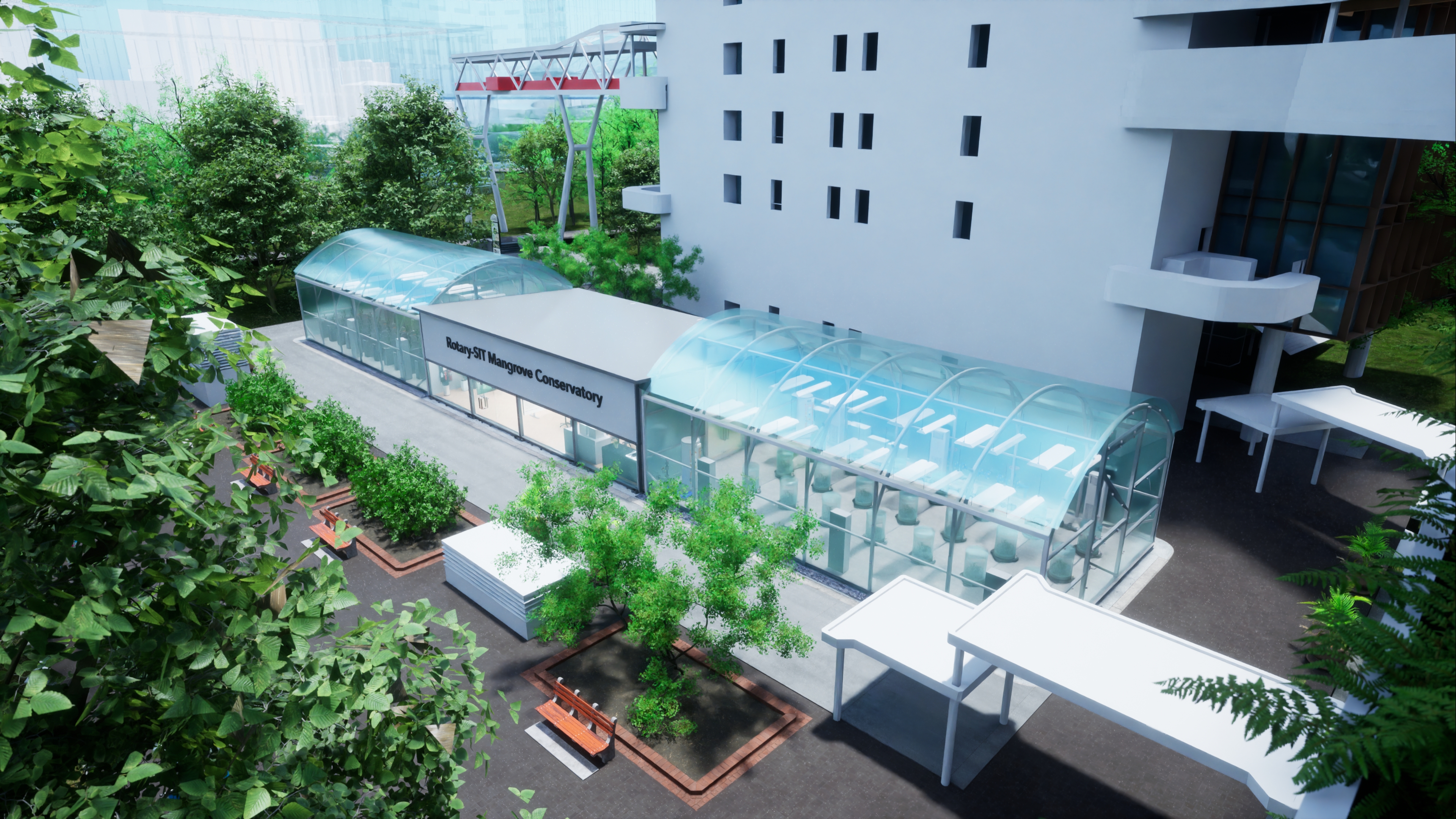
The mangrove conservatory will be situated along the Punggol Heritage Trail next to the Punggol Coast MRT Station and SIT Punggol Campus.
The Rotary-SIT Mangrove Conservatory will be an integrated platform for applied research, education, and community outreach centred on mangrove biodiversity and conservation. It will support climate resilience through ecosystem restoration and nature-based climate adaptation, while fostering regional collaboration within ASEAN to address rising sea levels and biodiversity loss.
The Conservatory will focus on several key areas of research. One area of study will examine the biodiversity and development of different mangrove species, to better understand their characteristics and adaptability. Another will explore the ability of mangroves to sequester carbon and function as natural coastal buffers, providing protection against rising sea levels and coastal erosion. In addition, the Conservatory will investigate restoration techniques that can support long-term ecological resilience both in Singapore and across the region.
For researchers and students, the Conservatory offers a controlled environment to simulate climatic and tidal inundation conditions. It provides a hands-on applied learning environment for SIT students across engineering, design, and sustainability disciplines and will support capstone projects and cross-disciplinary fieldwork.
To support its community outreach efforts, the Conservatory will have public-facing features such as interactive exhibits, real-time displays of mangrove distribution, and educational tools that explain mangrove ecosystems, their biodiversity and their vital role in mitigating climate change.
Mr Chew Ghim Bok, Rotary International Director and Chairman, Foundation of Rotary Clubs Singapore, said, “The Rotary-SIT Mangrove Conservatory is more than just a project. It is a powerful symbol of what we can achieve when community, education, and purpose come together. Mangroves may be nature’s quiet guardians, but they play an outsized role in protecting our shores, nurturing biodiversity, and fighting climate change. This Conservatory will serve as a living classroom, a hub for applied research, and a platform for inspiring environmental stewardship, especially among our youth. Rotary is proud to support this meaningful effort, which reflects our commitment to protecting the environment and creating lasting impact. The seed we plant today will grow into a legacy of sustainability and service for generations to come.”
The construction of the Conservatory will commence by the end of 2025 and is projected to be completed by the end of 2026.
Watch to find out more about the Rotary-SIT Mangrove Conservatory.
About Singapore Institute of Technology
As the university for industry and Singapore's first university of applied learning, the Singapore Institute of Technology (SIT) offers industry-relevant degree programmes that prepare its graduates to be work- and future-ready professionals. Its mission is to maximise the potential of its learners and to innovate with industry, through an integrated applied learning and research approach, so as to contribute to the economy and society.
The University’s unique pedagogy integrates work and study, embracing authentic learning in a real-world environment through collaborations with key strategic partners. Its focus on applied research with business impact is aimed at helping industry innovate and grow. SIT’s new centralised campus within the larger Punggol Digital District features a vibrant learning environment where academia and industry are tightly integrated with the community.
For more information, visit www.SingaporeTech.edu.sg
[1] FRCS is an Institution of a Public Character (IPC) - the charity arm of all Rotary Clubs in Singapore.















![[FA] SIT One SITizen Alumni Initiative_Web banner_1244px x 688px.jpg](/openhouse2025/directory/openhouse/centre-professional-communication/sit-teaching-and-learning-academy/centre-professional-communication/sites/default/files/2024-12/%5BFA%5D%20%20SIT%20One%20SITizen%20Alumni%20Initiative_Web%20banner_1244px%20x%20688px.jpg)
